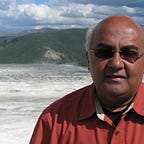Death…..actually Rebirth
A Conversation
PERSON 1: Does a person leave his body after death?
PERSON 2: If the person is dead, who is there to depart?
PERSON 1: Isn’t death itself the departing process? …a process whereby life as we knew it left the body to go somewhere.
PERSON 2: And what would you mean when you say ‘life’?
PERSON 1: Life as in a soul, an invisible soul substance, or an energy that inhabited the body that made the person alive.
PERSON 2: And where would it depart to?
PERSON 1: Another abode unknown to us, heaven, hell, or another body, maybe?
PERSON 2: Would the soul that departs be pure and perfect? Or would it reflect the sins and virtues of the person or being at the moment of death?
PERSON 1: I don’t know. That it is pure is the conventional view of most Hindus, right? But if it is pure and untainted by who we were, then I guess one may ask why it inhabited an imperfect body in the first place, and why the being could have had faults and afflictions, been dishonest, even evil, for instance. A pure soul sitting in an impure body capable of bad behavior does not make sense. Likewise, a single lifetime for a pure soul in an afflicted body, followed at death by a disappearance into a heavenly abode makes no sense. A continued existence in another body also has the same flaw… why would it seek another afflicted body again in another life when it is already pure?
An impure substance is what we have left as a possibility. All mental energies, good and bad, are taken away to another abode or life. But again, what is the higher purpose for imperfect beings living a lifetime or in infinite rounds of rebirth…?
PERSON 2: Without addressing the higher purpose or first cause for the birth-rebirth cycle, can we agree that if there was a next life, the new individual will have the same character and qualities, virtues and faults, of the earlier individual, except in a new body? Let us leave aside for now any alterations that may occur in the transition between lives.
PERSON 1: Yes.
PERSON 2: That is the description of Karma.
PERSON 1: So you do believe in Karma?
PERSON 2: Yes.
PERSON 1: So then you do believe that there is something that leaves the body at death, something that is reborn? However, you said at first that if the person was dead, there would be no one to depart?
PERSON 2: True. I don’t however believe that death results in a departure of a Soul or Divine Energy from the body. I believe that the life-giving force cannot arise in it anymore. The body cannot support life.
PERSON 1: Hmm, so life, or the birth process, for you, is an outside force coming in, and which cannot be supported at death?
PERSON 2: Not an “outside” force, but a stored energy, as I will explain later. The body is no longer a fit receptacle for continued existence. Another embryo, another receptacle, will be found. Rather than death being a departure, it is an absence of an arising.
CHAPTER 2
PERSON 1: My turn to ask you then. What do you mean by life energy? What is it that arises?
PERSON 2: The arising and growth of a new being at birth is a complex process that involves a seed (root consciousness) from past Karma taking birth in an embryo, then developing the 5 characteristics (Corporeality, Perception, Feelings, Mentation, Consciousness) in the being over time through the nourishment of the body and sense impression. The Mentation aggregate, also termed Karma Formations, is the seed, or link, that holds all actions committed, in constant transformation as cause-effect cycles arise and extinguish, interdependent on the other four characteristics.
PERSON 1: OK… we’ll come back to that later. Karma however does not answer the ‘What is the Purpose’ or ‘First Cause’ question. I know you will have something to say about that, but first, I have another point. What if there was no energy migration to another life but just a dissipation of the energy at death. Nothingness. A life is over, and nothing happens. The being is dead. Nothing arises, nothing departs. The energy dissipates into the Universe. There is no grand ‘Purpose’, better yet, no need for it!
PERSON 2: Let’s follow that argument. What if the being performed harmful actions in his life? Say he hurt others and caused much suffering, and at death he hadn’t received his due. He escaped all punishment. He did not in addition feel remorse. Is there no consequence to that? No justice for the harm he or she inflicted? No recompense for the harmed?
PERSON 1: In this case, I guess, no. Why should there be? Maybe life is cruel.
PERSON 2: Then you would have to explain the existence of our conscience. Why do we seek justice for such acts, or feel it unfair and cruel that beings are born in terribly unfortunate circumstances? Being a product of a random, cruel system, we should not have intrinsic in our DNA, minds and hearts any sense of right or wrong. But we do take pride in creating laws and rules in our societies that reflect a conscience, praise conscientious acts, and emphasize and constantly seek compassion, justice, truth, and fairness as a solution to conflicts? It is inconsistent for a random birth and annihilation process to produce and dissipate beings that find that very same process unfair! Thus the existence of a conscience kills your argument.
Conversely, the existence of a conscience and the physical laws of cause and effect are fully consistent with the law of Karma.
